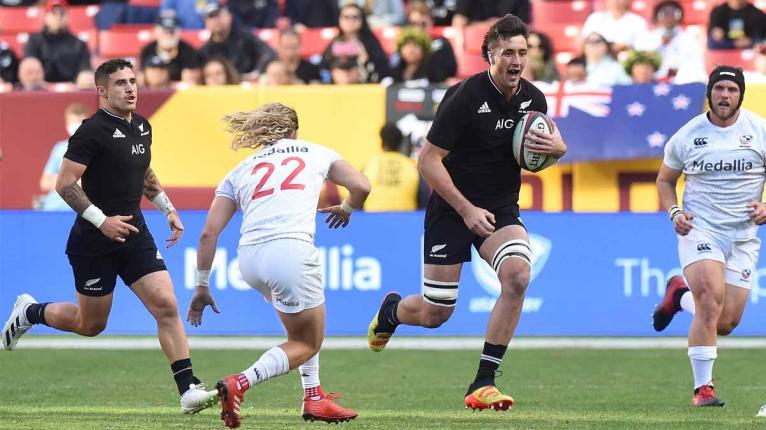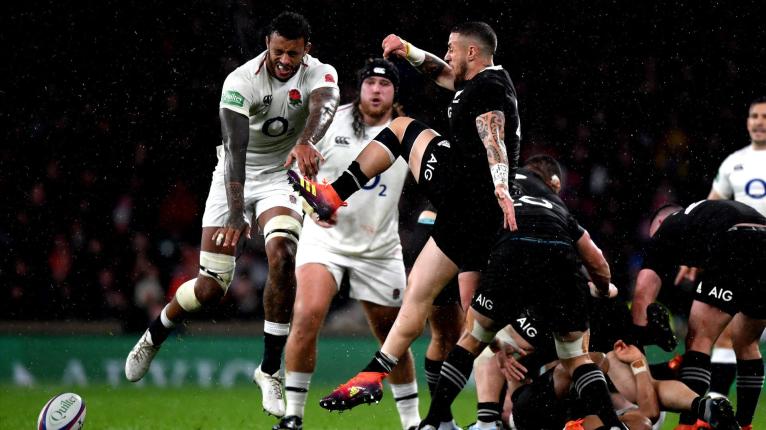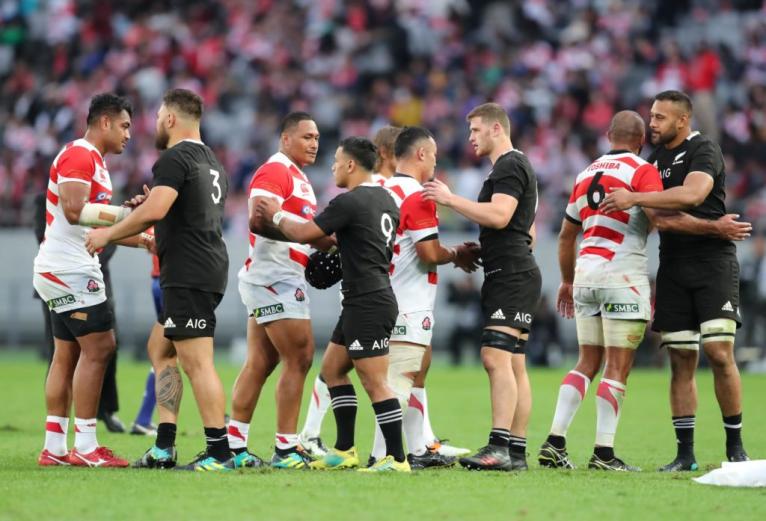It would seem, probably because of international rugby’s archaic financial model, that mostly everyone forgets, doesn’t realise or willfully ignores the fact that all test matches are big money earners.
A sold-out Six Nations test at Principality Stadium in Cardiff rakes in an estimated $8m to $10m of profit, just as a sold-out Autumn test against the All Blacks at the same venue produced between $8m to $10m of profit.
The difference, however, is that if the test is in the Northern Hemisphere and arranged outside of the designated World Rugby window, the way that generated profit is distributed changes.
Wales in the Six Nations games keep all the profit but their October 30 test against the All Blacks saw them hand over $2m to New Zealand Rugby. That was the deal that was agreed earlier in the year – the All Blacks would be happy to play, but they wanted a fee.
This arrangement has been portrayed by some in recent weeks as grossly commercial, cynical and a scourge of the modern game. Plenty of commentators teed off at the crassness of it all, citing it as a silly, pointless money grab that destabilised the credibility of the international programme.

None were more het up about than James Corrigan of the Daily Telegraph, who wrote: “Forget rugby – Wales’ date with the All Blacks is a stupid, cynical, money-making ploy.
“Unlike the three tests on the weekends thereafter, this, the undoubted glamour tie, is being contested outside of the international window.
“Wales will be under-strength and the only ones who will be fully loaded that day will be the libated portion of the 74,000-strong crowd.”
There were two things that appeared to be bothering the critics. The first was that because the game was being played outside the official window, Wales would not be able to access their English-based players who would be required to be on club duty.
And the second problem was that money would be changing hands – that it was being acknowledged that the highly professional and commercialised All Blacks would in fact be accepting cash for their labour.
Perhaps a third accusation has to be levelled, this one at the critics who may in fact have been guilty of gross exaggeration.
Both sides were missing key players because of circumstance and both were missing players because of injury. That’s the norm in any given test week.
Wales were denied access to just three players, Dan Biggar, Taulupe Faletau and Louis Rees-Zammit, who could fairly be described as first-choice. Fringe squad members Nick Tompkins, Callum Sheedy, Thomas Young and Christ Tshiunza were also unavailable but unlikely to have been picked anyway.
This was presented as an existential crisis for Wales and yet the All Blacks were in Cardiff without Aaron Smith, Scott Barrett and Patrick Tuipulotu while neither Sam Cane nor Dane Coles were available because Covid had denied them the chance to build the game-time they needed to be match-fit.
Both sides were missing key players because of circumstance and both were missing players because of injury. That’s the norm in any given test week and as All Blacks coach Ian Foster said several times when asked to justify why the game was being played: “I find it very hard to cheer up pessimists, so I won’t try to change their mind.
“All I know is it’s a test match, and the sign of the times is there are always players missing through injury and stuff. This has been scheduled for a long time, and it hasn’t surprised people.
“It’s a game both countries wanted, and everyone has had plenty of time to get ready for it. Some [missing players] are through injury, and injured players can’t play regardless of the international window. So I think the numbers have been blown up a little bit.”

Wales were hammered not because they were denied access to their English club players or a bloated casualty ward, but because they couldn’t cope with the pace and intensity of the All Blacks.
In the wake of the 54-16 defeat, there have been predictable commentaries about the bravery of the Welsh to stick their finger in the dyke for as long as they did before the inevitable All Blacks surge came, but there is a colder truth to be told here which is that Wales were horribly outclassed because they have fallen a long way behind New Zealand.
Maybe the reality of Covid hitting and putting inter-Hemisphere fixtures on hold for two years is that the South have surged ahead in the speed at which they can play and the accuracy of their skill execution.
As for the idea that the test in Cardiff was cynical because of its overtly commercial basis, that seems to belong to an old British hang-up of seeing talk of money as vulgar. It’s almost as if everyone is okay with test matches making money as long as that fact is never acknowledged or talked about.
International rugby works on a quid pro quo basis where Wales keep their Six Nations gate loot and all the other cash they generate from playing home tests, just as the All Blacks keep all their ticket revenue when they play in New Zealand.
The July and November test windows continue to be determined by a farcically outdated secret system which appears to randomly allocate tests years in advance.
Is it really such a shock, or a crass set of arrangements for two consenting nations, as it were, to agree to play a fixture against each other under different, negotiated terms that could mutually benefit both parties?
Also, it seems strange that the game in Cardiff generated so much indignation when these ‘additional’ or, ‘out of window’ tests have been standard fare for the better part of the last two decades.
The All Blacks have been squeezing so-called commercial fixtures into their schedule since 2005 as has every other major nation and the motivation for doing so hasn’t been exclusively commercial.
The July and November test windows continue to be determined by a farcically outdated secret system which appears to randomly allocate tests years in advance.
Taking the All Blacks as an example, some years their schedule ends up being compelling, others, though, it barely registers and NZR goes looking for tougher games to bulk up the challenge.

The randomness of allocations means New Zealand played England four times in 2014, but not again until 2018 and the next fixture won’t be until 2022.
The All Blacks’ ‘arranged’ test against Wales on October 30 has served not as a vehicle to carry the rage of the morally offended, but as a means to pressure World Rugby into changing the current set-up into one that makes more sense, delivers more value and generates greater interest.
Whatever some in the media felt about the game, wasn’t shared by the rugby public according to Wales Rugby Union chief executive Steve Phillips, who says the stadium could have been sold out twice over.
“It’s sold out and we could probably sell it out again. In terms of financial contribution for the year, it’s fundamentally important. It then funds the game and it’s a virtual circle.
“It’s great news to have them [New Zealand] coming here. It’s great financially and commercially, it’s great for our brand. Literally everything is sold out – every ticket and every hospitality space.”
Around the international window we are actually working really closely with lots of different national unions about the possibility of a global calendar which would roughly see about the same amount of test matches played as has historically been played.
NZR chief executive Mark Robinson
The popularity of the fixture shouldn’t have been a surprise as it was a test between the reigning Six Nations and Rugby Championship winners.
These are the types of games the world wants to see – but rather than have them arranged outside the window and then shoe-horned around the established, random allocation of tests, why not build a better system that enables more meaningful, marketable tests to be played every year?
If the July and November test programmes were not so random, but instead part of some inter-hemisphere competition geared towards a final, it would create a concept that could be sold for significant sums of money.
The broadcast and sponsorship values would shoot through the roof and all the participating teams would benefit, the money would flow as it mostly does without being visible and arguably, teams such as the All Blacks would feel less inclined to play additional games outside of the allocated windows – or at least restrict those sorts of games to specific geographic areas such as Japan and North America where NZR have long had a plan to grow their presence in those markets.

NZR chief executive Mark Robinson says he’s hopeful that progress will be made on revamping the current calendar after the next World Cup and that will create more intrigue and value for fans, while leaving the option open for the All Blacks to play selective games in selective territories.
“Around the international window we are actually working really closely with lots of different national unions about the possibility of a global calendar which would roughly see about the same amount of test matches played as has historically been played,” he said.
“Over recent times, we have been clear that the opportunity to create value sits in Asia and North America and that view hasn’t changed either. There are different ways we can connect with fans in those parts of the world, one of which is playing test matches.
“We know that our athletes can’t sustain more rugby than they play at the moment.”
Of course, many have heard the promise of a global season many times before and have lost faith it will ever happen. But what’s apparent now is that international rugby can’t and won’t survive if it doesn’t evolve and change a system that is not working.
The splotches of red across the balance sheets of every major union will compel those previously reluctant to agree to a new set-up for July and November.


Comments
Join free and tell us what you really think!
Sign up for free